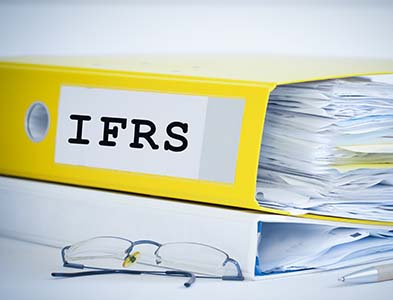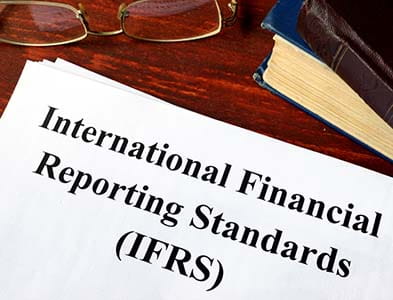New IFRS 17 Will Affect Many Companies With Insurance Contracts
New IFRS 17 Will Affect Many Companies With Insurance Contracts
IFRS 17, international reporting standards for insurance contracts, has implications not only for accounting and finance, but also taxes, policies, and processes.
Beginning in 2023, the new International Financial Reporting Standards 17, Insurance Contracts, applies to all ‘‘insurance contracts’’ regardless of the issuer, with implications not only on accounting and finance, but also taxes, policies, and processes.
The new standard, known as IFRS 17, applies to more than just insurance companies. Some non-insurers could issue a contract to which IFRS 17 will apply, such as entities that issue product breakdown contracts or a car dealer that issues roadside assistance and maintenance contracts. Other entities that may be impacted include general building, mining, civil, manufacturing, and transportation businesses.
IFRS 17 replaces IFRS 14, Insurance Contracts. These new insurance contract standards include the definition of an insurance contract:
An insurance contract is a contract under which one party (the issuer) accepts ‘‘significant insurance risk’’ from another party (the policyholder) by agreeing to compensate the policyholder if a specified uncertain future event (the insured event) adversely affects the policy holder.
Similar to other accounting standard changes and implementations, companies reporting under IFRS will need to determine whether they are impacted by these new insurance standards, and if so, assess the impacts of potential choices to the company’s financial position and operations, including financial reporting.
Company executives must act decisively to address the strategic implications and challenges of adopting IFRS 17, as its impact would be far beyond the finance function.
How Do You Know if You Are Affected by IFRS 17?
If you have an insurance contract, you will need to look at your contracts now and assess whether you have issued an insurance contract in the scope of IFRS 17. The following steps should be able to assist you in evaluating whether your insurance contract is in the scope of IFRS 17. Similar to the definition of contracts under revenue or lease standards, under IFRS 17, contracts can be written or oral, or they can be implied by a company’s customary business practices. Enforceable terms are a matter of law, while implied terms include those imposed by law or regulation.
When assessing if the insurance risk is significant:
- Know that the likelihood of the event occurring is not a consideration for the insurance risk to be significant. It is based on what could be paid if it results in a loss
- Assess significance at individual contract levels
- Consider the time value of money when determining significance
IFRS 17 allows entities to choose to apply either IFRS 17 or another standard to the following insurance contracts:
- Financial guarantee, which grant the policyholder the right to be reimbursed by the issuer for a loss that it incurs when a specified debtor fails to make payment when it is due under the terms of a debt instrument. IFRS 17 may be applied to these contracts; otherwise, the issuer shall account for a financial guarantee contract in accordance with the financial instrument standards.
- Fixed-fee service that meet certain conditions.
- Loan contracts that meet the definition of an insurance contract but limit the compensation for insured events to the amount otherwise required to settle the policyholder’s obligation by the contract.
Other types of contracts that may be exempted from IFRS 17 are as follows:
- Credit card contracts or similar contracts that provide credit or payment arrangements that meet the definition of an insurance contract if the company does not reflect an assessment of the insurance risk associated with an individual customer in setting the price of the contract with that customer. In the latter situation, apply IFRS 9, Financial Instruments, and other applicable standards. However, IFRS 17 is applied to any contractual insurance components that are separated in accordance with IFRS 9.
- Warranties provided by a manufacturer, dealer, or retailer in connection with the sale of its goods or services to customers as in the scope of IFRS 15 and IAS 37, Provisions, Contingent Liabilities and Contingent Assets, even if they meet the definition of an insurance contract. However, if the product warrant is issued by a sister company of the retailer when the asset is sold, the warrant is in the scope of IFRS 17 in the sister company’s separate financial statements and would be subject to possible application of the fixed-fee service contract election because the warrant is not issued with the sale of the goods by the sister company itself. For consolidation purposes, the warranty will be out of scope of IFRS 17 because it was issued in connection with the sale of the goods of the consolidated entity.
- Contingent consideration payable or receivable in a business combination — apply IFRS 3, Business Combinations.
- Contractual rights/obligations contingent on the future use of, or right to use, a non-financial item such as royalties, variable and other contingent lease payments, license fees, and similar items — apply IFRS 15 and IAS 38, Intangible Assets, or IFRS 16, Leases.
- Residual value guarantees provided by a manufacturer, dealer, or retailer and a lessee’s residual value guarantees when they are embedded in a lease — apply IFRS 15 or IFRS 16.
- Employer’s asset and liabilities — apply IFRS 2, Share-based Payment; IAS 19, Employee Benefits; or IAS 26, Accounting and Reporting by Retirement Benefit Plans.
Policies/Elections
Once you have assessed and considered whether you have contracts that might meet the definition of an insurance contract, you would need to make an accounting policy election based on whether your contracts will be in the scope of IFRS 17. It is important to consider whether you may need to make any elections when deciding how to account for those contracts.
Systems, Processes, and Controls
Implementation of IFRS 17 goes beyond the technical accounting and finance functions. In order to ensure that your company will effectively implement these new insurance standards, you will need to understand and evaluate the strategic implications and challenges that IFRS 17 implementation may have to your organization, including whether you have the appropriate controls and processes in place. Also, you will need to assess the accounting and tax implications under IFRS 17 for any new contracts.
Tax Considerations
The implementation of the IFRS 17 standard also has tax implications from the measurement of the insurance liabilities to the calculations of current and deferred taxes.
According to IFRS 17, tax cash flows must be taken into account when determining the fulfillment cash flows to assess the IFRS 17 assets and liabilities. When implementing the requirements of IFRS 17 standards, the insurer will need to perform a detailed analysis based on the nature of the specific tax charge and related policy terms on a local tax jurisdiction basis, as taxes vary significantly across countries and between types of businesses.
Since IFRS 17 only refers to certain tax cash flows that are included in the fulfillment cash flows and does not contain specific requirements regarding income tax positions of an insurer itself, the principles and requirements of the applicable IFRS tax standards (IAS 12) will continue to apply after the effective date of IFRS 17.
The new accounting model for insurance contracts will also affect the temporary differences between the carrying amount of IFRS 17 balance sheet positions and the corresponding local tax base. In the financial statements prepared under IFRS 17, temporary differences may change as a result of the restatement of insurance assets and insurance liabilities, while the corresponding local tax bases does not change. A technical analysis is necessary to determine the allocation of IFRS 17 accounts to the corresponding tax base. The result of the technical analysis will need to be implemented within your tax reporting processes and tax systems. Accordingly, you will need to develop and adopt a compliant and consistent tax accounting methodology at jurisdictional levels, ensuring all temporary differences are properly identified and recorded at a local level and can be cross-referenced for group tax reporting purposes. You will also need to consider the transition adjustments resulting from differences between IFRS 17 and IFRS 4 in the opening balance sheets.
Also at the consolidation level, you will need to consider the impact of IFRS 17 transition adjustments to the reconciliation of the group’s effective tax rates as well as in the determination of potential uncertain tax positions on the group’s financial statements.
To recognize the IFRS 17 impact on the reporting process, you must analyze the respective tax impacts on each stage at local tax regimes, and you must adjust your policies, data, and systems with regard to tax reporting and tax accounting requirements under IFRS 17 and the expected future tax payments for IFRS 17 measurement models.
Originally published in Bloomberg Tax





